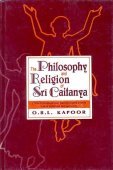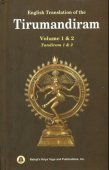Sanatana, Sanātana: 19 definitions
Introduction:
Sanatana means something in Hinduism, Sanskrit, Marathi, Hindi. If you want to know the exact meaning, history, etymology or English translation of this term then check out the descriptions on this page. Add your comment or reference to a book if you want to contribute to this summary article.
Sanatana has 19 English definitions available.
Alternative spellings of this word include Sanatan.
Languages of India and abroad
Sanskrit dictionary
[Deutsch Wörterbuch]
Source: Cologne Digital Sanskrit Dictionaries: Böhtlingk and Roth Grosses Petersburger WörterbuchSanātana (सनातन):—(von sanā)
1) adj. (f. ī) ewig, unvergänglich, beständig, dauernd [Amarakoṣa 3, 2, 22.] [Hemacandra’s Abhidhānacintāmaṇi 1452.] [Anekārthasaṃgraha 4, 197.] [Medinīkoṣa Nalopākhyāna 218.] [Halāyudha 1, 125.] [Atharvavedasaṃhitā 10, 8. 22. fg.] [The Śatapathabrāhmaṇa 6, 4, 4, 17. 7, 1, 1, 2. 28. 3, 1, 32.] upākhyāna [KATHOP. 3, 16.] [Suśruta 1, 6, 5.] guhya [MAITRYUP. 6, 34.] śruti [Manu’s Gesetzbuch 3, 284.] trayaṃ brahma [1. 23.] vedaśāstra [12, 99.] brahmayoni [Mahābhārata 14, 1139.] dharma [Manu’s Gesetzbuch 7, 98. 9, 64.] [Rāmāyaṇa 2, 30, 38.] [Rāmāyaṇa] [Gorresio 2, 16, 32. 4, 17, 29.] [KĀM. NĪTIS. 2, 18.] [Spr. (II) 6732. 7470. 7557.] [Bhāgavatapurāṇa 3, 16, 18.] [Vetālapañcaviṃśati] in [Lassen’s Anthologie (III) 27, 5.] yajña [Manu’s Gesetzbuch 1, 22.] [Spr. (II) 6715.] vartman [1107.] [Rāmāyaṇa 5, 11, 22.] [KĀM. NĪTIS. 3, 37.] [Bhāgavatapurāṇa 4, 2, 31.] vidhi [Manu’s Gesetzbuch 9, 325. 10, 7.] vṛtti [Mahābhārata 3, 12753.] [Spr. (II) 206.] kārya [1448.] sthiti [Mahābhārata 3, 10581.] saṃkalpa [13, 4025.] cakṣus [Manu’s Gesetzbuch 12, 94.] astra [Mahābhārata 3, 11986. 7, 2838.] lokāḥ [Spr. (II) 2099.] jambūvṛkṣa [Mahābhārata 6, 273.] kulavaṃśa [Rāmāyaṇa Gorresio 2, 119, 34.] kumāra [Mahābhārata 5, 1566.] pṛthivyā nirbhedaḥ [Rāmāyaṇa 1, 41, 4.] yauvarājya [2, 26, 26.] pumaṃs [Prabodhacandrodaja 114, 7.] göttliche Wesen [Manu’s Gesetzbuch 1, 7. 6, 79.] [Rāmāyaṇa 1, 41, 25. 5, 1, 54.] [PAÑCAR. 2, 3, 29. 4, 6. 4, 1, 17.] fem. tanā [Bhāgavatapurāṇa 2, 2, 32.] superl. sanātanatama [Mahābhārata 6, 773. 13, 4030.] —
2) m. a) Bez. Brahman's [Hemacandra’s Anekārthasaṃgraha] Viṣṇu’s [Trikāṇḍaśeṣa.1,1,30.] [Hemacandra’s Abhidhānacintāmaṇi 216.] [Hemacandra’s Anekārthasaṃgraha] [Medinīkoṣa] [Halāyudha.1,25.] [Oxforder Handschriften 190,b,11.] [Bhaṭṭikavya.1,1.] Śiva’s [Hemacandra’s Anekārthasaṃgraha] [Medinīkoṣa] — b) = pitṝṇāmatithiḥ [Hemacandra’s Anekārthasaṃgraha] = pitṛtithyantara [Medinīkoṣa] — c) Nomen proprium α) eines Ṛṣi (eines geistigen Sohnes des Brahman im Epos und später) [Taittirīyasaṃhitā 4, 3, 3, 1.] [The Śatapathabrāhmaṇa 14, 5, 5, 22. 7, 3, 28.] [Mahābhārata 2, 111. 12, 13078.] [Harivaṃśa 12437.] [Colebrooke 1, 144.] [WEBER, Rāmatāpanīya Upaniṣad 306.] [Varāhamihira’s Bṛhajjātaka S. 48, 62.] [Weber’s Verzeichniss No. 206. 366. 1143. fg.] [GAUḌAP.] zu [SĀṂKHYAK. 1. 43.] [Bhāgavatapurāṇa 3, 12, 4. 10, 87, 5.] [PAÑCAR. 1, 10, 60.] — β) eines Fürsten [TĀRAN. 230.] eines Autors [HALL 19. 144.] [WILSON, Sel. Works 1, 154. 158. 167. fg.] —
3) f. ī Bez. der Durgā [?(Oxforder Handschriften 25], a, 35), der Lakṣmī und der Sarasvatī [Śabdaratnāvalī im Śabdakalpadruma]
Sanskrit, also spelled संस्कृतम् (saṃskṛtam), is an ancient language of India commonly seen as the grandmother of the Indo-European language family (even English!). Closely allied with Prakrit and Pali, Sanskrit is more exhaustive in both grammar and terms and has the most extensive collection of literature in the world, greatly surpassing its sister-languages Greek and Latin.
See also (Relevant definitions)
Starts with: Sanatana gosvamin, Sanatana sharman, Sanatana tarkacarya, Sanatanadharma, Sanatanadharmi, Sanatanagosvami, Sanatanam, Sanatanasharman, Sanatanasiddhanta, Sanatanatama, Sanatanayoga.
Ends with: Rupasanatana.
Full-text (+118): Catuhsana, Haribhaktivilasa, Sanatna, Sanatanasiddhanta, Anishcintya, Sanatanatama, Purakalpa, Ujjvalarasakana, Bhaktisamdarbha, Bhaktibindu, Utpatsu, Sanatana tarkacarya, Kumara, Sanatra, Sanatana sharman, Karmavidhi, Sanatana gosvamin, Shailabha, Sanathan, Yogashatakavyakhyana.
Relevant text
Search found 81 books and stories containing Sanatana, Sanātana; (plurals include: Sanatanas, Sanātanas). You can also click to the full overview containing English textual excerpts. Below are direct links for the most relevant articles:
Shrimad Bhagavad-gita (by Narayana Gosvami)
Verse 11.18 < [Chapter 11 - Viśvarūpa-darśana-yoga (beholding the Lord’s Universal Form)]
Verse 7.10 < [Chapter 7 - Vijñāna-Yoga (Yoga through Realization of Transcendental Knowledge)]
Verse 4.30 < [Chapter 4 - Jñāna-Yoga (Yoga through Transcendental Knowledge)]
Brihad Bhagavatamrita (commentary) (by Śrī Śrīmad Bhaktivedānta Nārāyana Gosvāmī Mahārāja)
Verse 2.3.104-106 < [Chapter 3 - Bhajana (loving service)]
Verse 2.2.76 < [Chapter 2 - Jñāna (knowledge)]
Verse 1.3.44 < [Chapter 3 - Prapañcātīta (beyond the Material Plane)]
Amarakoshodghatana of Kshirasvamin (study) (by A. Yamuna Devi)
Introduction (Kṣīrasvāmin’s knowledge of grammar) < [Chapter 6 - Grammatical Aspects]
Bhajana-Rahasya (by Srila Bhaktivinoda Thakura Mahasaya)
Text 10 < [Chapter 4 - Caturtha-yāma-sādhana (Madhyāhna-kālīya-bhajana–ruci-bhajana)]
Text 24 < [Chapter 6 - Ṣaṣṭha-yāma-sādhana (Sāyaṃ-kālīya-bhajana–bhāva)]
Text 4 < [Chapter 8 - Aṣṭama-yāma-sādhana (Rātri-līlā–prema-bhajana sambhoga)]
Bhakti-rasamrta-sindhu (by Śrīla Rūpa Gosvāmī)
Verse 3.1.1 < [Part 1 - Neutral Love of God (śānta-rasa)]
Verse 2.1.295 < [Part 1 - Ecstatic Excitants (vibhāva)]
Verse 2.1.293 < [Part 1 - Ecstatic Excitants (vibhāva)]
Śrī Kṛṣṇa-vijaya (by Śrī Gunaraja Khan)
Related products





